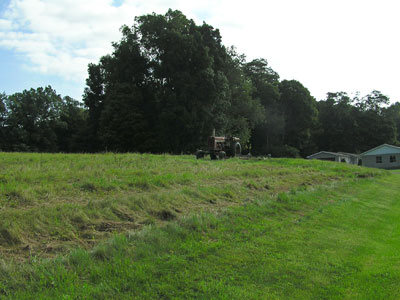Pittsburgh, Pa. – Jan. 3, 2019 – The Western Pennsylvania Conservancy has acquired farmland in Findley Township, Mercer County that will soon be available for lease to local farmers to grow crops or raise livestock as part of the Conservancy’s program to help support the local food economy by making land more accessible to local farmers.

The demand for locally grown food, coupled with rising interest in organic food and sustainable farming operations, continues to increase in the Pittsburgh region. To meet these demands, farmers need agricultural land in close proximity to local restaurants, farmers markets and food distributors.
This newly acquired 47-acre Mercer County farm, located just an hour north of Pittsburgh off of I-79, is the first of several new farm properties the Conservancy is working to acquire and then lease to farmers for diverse, small-scale agricultural operations. Leasing programs provide successful options near urban areas where high land prices make it challenging for farmers, particularly those who are new to the industry, to acquire land.
“We want to help address the challenge of land access and make affordable farmland available to farmers who want to grow local foods for the Pittsburgh food market, said Tom Saunders, president and CEO of the Conservancy. It’s a nice bridge between two goals: the Conservancy protects open space, including farmland, and with this program we can also help local farmers wanting to provide fresh, local foods to our markets here in Pittsburgh.”
The Conservancy already has an established model for its new initiative. At its 394-acre Plain Grove Fens Natural Area in Lawrence County, WPC leases 57 acres to Fallen Aspen Farm, a grower of livestock and produce for the Pittsburgh market. The farm, in operation since October 2014, distributes products through direct sales, including scheduled farm pick-ups and city deliveries.
Jake Kristophel, who co-owns Fallen Aspen Farm with his wife Desiree, grew up with a farming ethic but admits they weren’t ready for all of the demands and challenges of starting out in the industry.
“Purchasing land and equipment to operate a farm are among the biggest financial challenges most new farmers will face,” said Kristophel. “The option to lease land made farming more attractive and affordable for us, and leasing continues to be the right choice for our small business.”
Saunders says other land trusts around the country also are combining land protection goals and helping farmers by allowing them access to affordable farmland.
“Conservation organizations across the country with established leasing programs are serving a variety of different roles to support their local food industries,” he said. “Through this proactive effort, we believe we can partner with other organizations and support existing local efforts while protecting the ecological significance and agrarian heritage of our region’s lands.”
Farmers interested in leasing acres of the farm in Mercer County should contact the Conservancy at 412-288-2777 or land@paconserve.org for more information. A downloadable map of the property is available.
The Western Pennsylvania Conservancy is a nonprofit conservation organization and is accepting donations of land for its Farmland Access Initiative. Landowners wishing to donate land suitable for organic farming within an hour of the Pittsburgh region are encouraged to also call the Conservancy at 412-288-2777 for more information regarding conservation options.
Funding for WPC’s Farmland Access Initiative is made possible by the generosity of the Henry L. Hillman Foundation and an anonymous donor.
###
Photos and a map of the property are available for download for media use courtesy of the Western Pennsylvania Conservancy.
About the Western Pennsylvania Conservancy:
The Western Pennsylvania Conservancy (WPC) enhances the region by protecting and restoring exceptional places. A private nonprofit conservation organization founded in 1932, WPC has helped to establish 11 state parks, conserved more than a quarter million acres of natural lands and protected or restored more than 3,000 miles of rivers and streams. The Conservancy owns and operates Fallingwater, which symbolizes people living in harmony with nature. In addition, WPC enriches our region’s cities and towns through 130 community gardens and other green spaces that are planted with the help of about 12,000 volunteers. The work of the Western Pennsylvania Conservancy is accomplished through the support of more than 10,000 members. For more information, visit WaterLandLife.org or Fallingwater.org.
Media Contact:
Carmen Bray
Director of Communications
412-586-2358
cbray@paconserve.org
